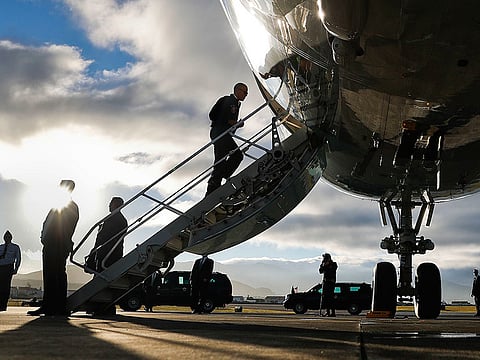Europe’s growing fear with rise of the Right
No wonder Obama, on his last tour of the continent as US President, tried to keep the morale of America’s allies across the Atlantic high

Whether it is the spread of terrorism, climate change, uncertainty in the Middle East, Iran’s ambitions in the region, the tussles in war-torn Syria, the scourge called Daesh (the self-proclaimed Islamic State of Iraq and the Levant) migration, racism or the rise of nationalistic sentiments across the Atlantic — these are clear signs of an alarmingly fast-changing world.
These developments make the world a more dangerous place than it has ever been. However, this unique sense of fear is unifying almost all the entire governments of the free world, particularly in Europe, for the first time since the collapse of the Soviet Union two and-a-half decades ago. The outgoing United States President, Barack Obama, has been welcomed by his European partners more than ever before during his latest tour of the Continent. In fact, under the latest circumstances, this tour was widely considered more than just an event marking the end of his two-term presidency. Obama’s talks with European leaders would likely go down in history books as the most significant discussion an American president has ever had with America’s allies across the Atlantic in many years.
There is clearly a great deal of unprecedented anxiety among various European Union countries because of Donald Trump’s win in the US presidential election. Therefore, the discussions focused squarely on ways to fit this unknown leadership quantity into this fast-changing world. Equally intriguing at the moment is the question of how deep an influence a Trump administration will have on the world.
Interestingly, Germany, as Europe’s engine, was the clearest in its reaction to Trump’s election by unequivocally expressing its anxiety on several levels — whether by officials or by its media outlets. German Chancellor Angela Merkel explained in her congratulatory message to President-elect Trump the reasons behind her country’s worries“Germany’s ties with the US”, she said in her cautionary note, “are deeper than with any country outside of the EU.”
More importantly, she listed the values that bind the two countries as “democracy, freedom, respect of rule of law, dignity for each and every person regardless of their origin, skin colour, creed, gender, sexual orientation or political views.” Merkel was bluntly open when she concluded: “Based on these values, I wish to offer close cooperation — both, with me personally and between our countries’ governments.” Her deputy, Sigmar Gabriel, went a step further and bluntly accused Trump as being “the trailblazer of a new authoritarian and chauvinistic international movement”.
There is a remarkable bit of historical irony in Merkel’s note — reminding the 45th American president of how much her country owes its democracy to US intervention 70 years ago.
Obama was very careful to keep the morale of his country’s European allies high by concentrating, in his talks, on what measures were needed to be taken to control any damage that might arise in the wake of Trump’s election. There is a common feeling among leaders across the Atlantic that what is at stake now is the essence of the political system of liberal democracy. In fact, Obama was the first to raise this issue during a press conference held at the White House following his meeting with President-elect Trump. Liberal democracy is largely considered to being applied to in some European countries, particularly after a majority of British voters opted to leave the EU in the Brexit referendum last June.
Brexit was first promoted under different names for many years before it was adopted by the United Kingdom Independent Party (Ukip), an extremely rightist group and mostly an offshoot of the Conservative party. Its current leader, Nigel Farage, a member of the European Parliament, considers Brexit as the ultimate move by Britain towards “independence” from the EU.
In several European countries, including those considered to be the cornerstone of the EU, namely Germany and France, there is a serious concern about the consequences of the rise of right-wing political parties across the continent. Both Merkel and French President Francois Hollande are facing general elections next year and it will be quite risky at this stage to make any predictions about the results of those elections. Berlin finds it difficult to overcome the political fallout from the refugee crisis and how to deal with the rise of its own right-wing populist party — Alternative for Germany.
With the success of right-wing political parties in Poland and Hungary, and possibly soon in Austria, France may not be immune to a domino effect. The well-experienced, right-wing leader of the French National Front, Marine Le-Pen, congratulated Trump and she strongly believes the Republican’s election as the next president of the US would help the process of breaking up the EU.
Sign up for the Daily Briefing
Get the latest news and updates straight to your inbox



